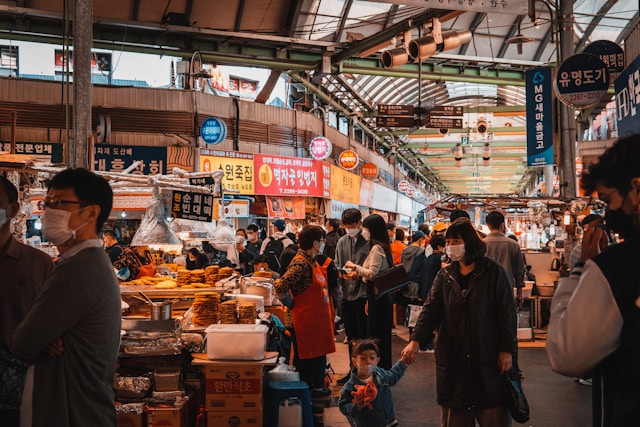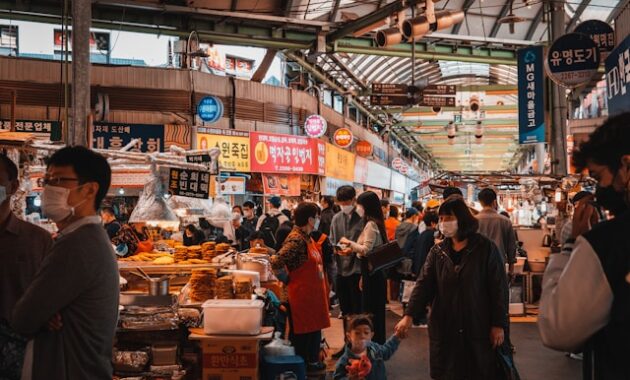
Seoul, the vibrant capital of South Korea, is a culinary paradise that offers a harmonious blend of traditional flavors and innovative dining experiences. From bustling street markets to high-end Michelin-starred restaurants, Seoul’s food scene is as diverse as its rich culture. Join us on a journey through the must-try dishes and hidden culinary gems that define the essence of Korean cuisine.
Discovering Seoul’s Culinary Identity
Seoul’s culinary culture is rooted in centuries-old traditions yet constantly evolving to embrace modern influences. At its heart lies a philosophy of balance—blending flavors, textures, and nutritional benefits into every dish. The foundation of Korean cuisine is the use of fresh, seasonal ingredients paired with fermented foods like kimchi and doenjang (soybean paste) to create complex, umami-rich flavors.
Street Food Heaven: A Taste of Seoul’s Night Markets
Gwangjang Market: A Feast for the Senses

As one of Seoul’s oldest traditional markets, Gwangjang Market is a haven for street food lovers. The market is famous for its bindaetteok (mung bean pancakes), which are crispy on the outside and packed with earthy flavors. Pair it with a tangy soy-based dipping sauce for an authentic experience.
Other must-try delights include:
- Tteokbokki: Chewy rice cakes simmered in a spicy-sweet gochujang sauce.
- Mayak Gimbap: Bite-sized seaweed rice rolls, often dubbed “addictive” due to their irresistible taste.
- Hotteok: Sweet pancakes filled with brown sugar, cinnamon, and nuts, served piping hot.
Myeongdong: The Hub of Modern Street Food
Myeongdong’s streets are lined with vendors offering Instagram-worthy snacks that cater to adventurous palates. Indulge in:
- Korean Fried Chicken Skewers: Double-fried to achieve a golden crunch and smothered in sticky sauces.
- Grilled Lobster Tails: Drizzled with garlic butter for a luxurious treat.
- Egg Bread (Gyeranppang): A soft, sweet bread baked with an egg on top.
Traditional Korean Dishes: Unmissable Classics
Bibimbap: A Colorful Harmony in a Bowl
Bibimbap is the epitome of balanced eating, combining steamed rice, sautéed vegetables, a fried egg, and gochujang (red chili paste). The dish is often served in a hot stone bowl, which crisps the rice at the bottom, adding a delightful texture.
Samgyeopsal: Grilled Pork Belly Perfection
No visit to Seoul is complete without experiencing Korean barbecue. Samgyeopsal, thick slices of pork belly grilled at your table, is a communal experience that brings friends and family together. Wrap the grilled meat in lettuce leaves with garlic, ssamjang (a savory dipping sauce), and a slice of kimchi for the perfect bite.
Kimchi Jjigae: The Comforting Stew
This spicy kimchi stew is a staple of Korean households. It combines aged kimchi with tofu, pork, and scallions, resulting in a dish that’s hearty, flavorful, and packed with probiotics. It’s best enjoyed with a bowl of steamed rice on the side.
Exploring Seoul’s Michelin-Starred Restaurants
Gaon: A Taste of Korean Elegance
Gaon, a three-Michelin-starred restaurant, elevates Korean cuisine to an art form. Its tasting menus feature dishes like hanwoo beef and traditional fermented sauces prepared with utmost precision. The restaurant emphasizes seasonal ingredients and meticulous presentation.
Jungsik: Modern Korean Fusion
Jungsik blends traditional Korean flavors with global culinary techniques. Signature dishes like doenjang lamb and sea urchin bibimbap offer a creative twist on Korean classics. Each dish is a visual masterpiece that delights both the eyes and the palate.
Unique Culinary Experiences in Seoul
Temple Cuisine at Balwoo Gongyang
For those seeking a mindful dining experience, Balwoo Gongyang offers traditional Buddhist temple food. The vegetarian menu focuses on natural flavors, featuring dishes like lotus root patties and fermented soybean soups, which promote wellness and balance.
Makgeolli Breweries and Tastings
Makgeolli, a traditional rice wine, is a must-try beverage in Seoul. Visit local breweries like Sanullim 1992, where you can pair this creamy, slightly sweet drink with jeon (savory pancakes). Makgeolli tastings provide insight into the craft behind this beloved drink.
Desserts and Cafés: Sweet Indulgences in Seoul
Bingsu: The Ultimate Korean Dessert
Bingsu is a shaved ice dessert topped with ingredients like sweetened red beans, fresh fruits, and condensed milk. Modern variations include flavors like matcha, Oreo, and even cheese.
Themed Cafés: A Unique Korean Phenomenon
Seoul is home to an array of themed cafés that go beyond coffee. From cat cafés and book cafés to spots like StyleNanda Pink Pool Café, these venues offer both unique drinks and Instagram-worthy aesthetics.
Tips for Exploring Seoul’s Food Scene
- Timing is Key: Arrive early at popular markets like Gwangjang to beat the crowds.
- Learn the Basics: Familiarize yourself with simple Korean phrases for ordering food.
- Try Shared Meals: Korean dining culture emphasizes sharing dishes, so embrace the communal experience.
Seoul’s culinary landscape is a testament to its dynamic culture, offering something for every taste bud. Whether you’re savoring traditional dishes, indulging in street food, or exploring high-end gastronomy, the flavors of Seoul promise an unforgettable experience.